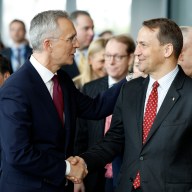WASHINGTON – Democrat John Edwards placed second in Iowa, third in New Hampshire and faces even longer odds of pulling off a win in upcoming states.
But he still attracts the support of as many as 20 per cent of Democratic voters in national polls. And where those Edwardians turn next if their first choice for president exits the race could well be the determining factor in who claims the Democratic nomination.
“Every time somebody drops out of a race when it’s close, where they go is important,” says Jenny Backus, a Democratic consultant who is not working for any candidate. And Edwards’ supporters, she says, “are even more priceless than your average jewel.”
That’s because this year’s race is so competitive, and Edwards’ supporters are viewed as loyal and dependable voters who will actually turn out on election day.
Barack Obama, with his outsider’s message of change, looks like a logical second choice for those attracted to Edwards’ pledge to fight special interests and corporate greed.
Indeed, Edwards voters in Iowa favoured Obama over Clinton as their second choice by a nearly two-to-one margin in caucus-night surveys. And Edwards supporters in New Hampshire reported they had a far more favorable impression of Obama than of Clinton, according election-night surveys there.
Donald Wood, 52, a one-time Edwards supporter from Merrill, Wis., fits that profile. Now that Edwards’ presidential prospects look dim, he’s leaning toward Obama.
“I think it’s time for this country to have a change,” Wood said in explaining his new interest in Obama. “With the troubles and everything that the Clintons had before, I don’t think the country needs those problems any more.”
Consultant Backus says that while Edwards voters are sure to find some of the same qualities that they like when they take a look at Obama, “there is definitely an opening for Hillary Clinton to exploit” as she pivots toward economic issues that hold appeal for populist-oriented Edwards supporters.
Democratic pollster Peter Hart said Obama has the easier sell to Edwards voters because of “a greater overlap of convergence” in the two candidates’ messages, but he nonetheless views Edwards’ voters as up for grabs if he drops out.
“People are supporting John Edwards for a lot of different reasons,” Hart said. “It’s not just based on an issue or a set of ideas. So I think it’s a jump ball.”
Unlike some past elections, where Democratic constituencies were sharply divided over candidates – Jimmy Carter versus Ted Kennedy for example – this time all the leading candidates are favourably viewed by a wide swath of the parties’ voters, Hart said. That makes it easier for people to shift from one candidate to another.
On the Democratic side, he said, “there just isn’t the rigid ideology that often shapes a race.”
Imogene Ragan, a 61-year-old from Huntington Beach, Calif., showed it’s more than message that will determine where voters’ loyalties lie. She said she’s backing Edwards because of “his presence” and because he seems to be honest. She said she might shift to Clinton if Edwards leaves the race, in part because Obama “seems more like a politician than a person.”
A mid-December survey of voters nationally conducted for the AP and Yahoo News found that Edwards supporters split about evenly between Clinton and Obama when asked which candidate would be their second choice. Clinton and Obama each were the second choices of about 27 per cent of Edwards supporters. Another 28 per cent were unsure who would be their second choice, and the rest were thinly scattered among other candidates.
Edwards draws much of his support from people over 50 and those without a college education, the survey found. His voters are more likely to be men than women, and a third are evangelical Christians, a much larger share than among Clinton or Obama voters.
Steve Jarding, a lecturer at Harvard who ran Edwards’ political action committee for a year, said Edwards voters won’t automatically switch to Obama even if Obama’s message is perceived to be more in synch with that of Edwards. The deciding factor instead may be which candidate is seen as more likely to prevail in November, he said.
“When you support a candidate and they don’t win, there’s just as much chance that then you say, ‘I’ll go with somebody who can win. I went with my heart, now I want to go with my head,”‘ Jarding said.
Two decades ago, Jarding said, voters rarely cast their ballots based on a strategic choice about who was most electable. Now, he says, particularly after chafing through eight years of the Bush administration and feeling burned by the loss of John Kerry in 2004, Democrats are saying, “We’ve got to win.”
The allure of the Edwards voters will not be lost on Clinton or Obama. No doubt either would love to have Edwards’ endorsement if the time comes, although it’s not clear how much weight that carries with voters.
For now, the two must tread carefully to court the Edwardians without offending them while their candidate still is in the race.
“You don’t want to start negotiations before the patient’s taken off life support,” said Jarding.
















